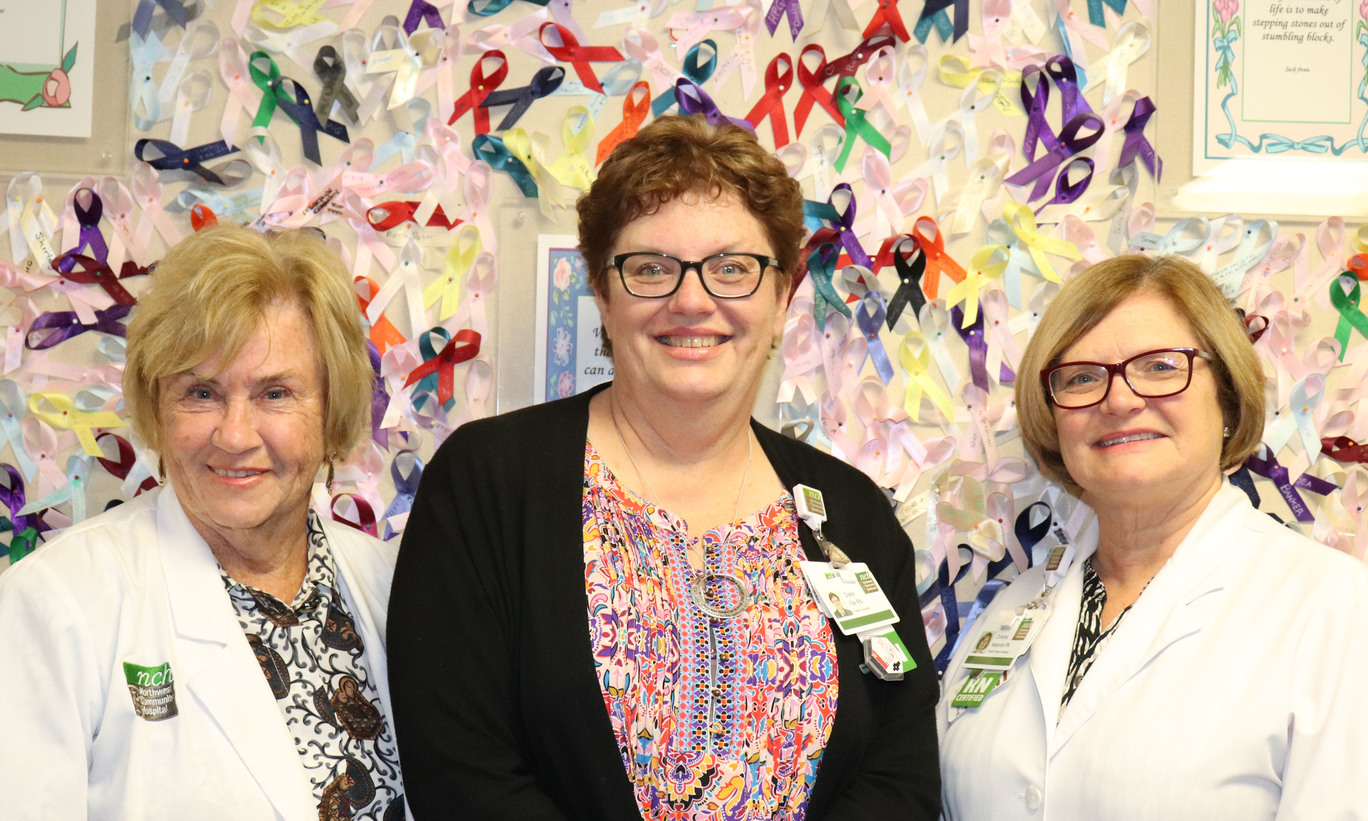What is a patient navigator? Part IV of our series
October 10, 2018

From cancer screening to diagnosis and treatment, these specially trained medical professionals guide you through the process. Our Patient Navigator series takes an in-depth look at a skilled group of caring people who support the award-winning cancer programs offered at NCH. Meet three ladies who support patients who’ve received a breast cancer diagnosis: Christine Masonick, R.N., MSN, OCN; Diane Fife, R.N., BSN; and Sandy Hoffman, RNC, MSN, APN.
What is the most interesting part of your job?
Christine: I love that every day is different. Each person comes with a unique history and journey and we are able to carry the light and walk with them during a very difficult time. I have observed so many women shattered at the time of their diagnosis and they come out stronger, forever changed, and in a better place by the end of treatment. The strength of the women has been inspirational to me.
Diane: I would have to say the most interesting part of my job is the variety that goes along with my position. I get to meet and interact with such wonderful people as a patient navigator. I’ve been in this role for almost three years. Every day is completely different, one of the many reasons I love what I do.
Sandy: The most interesting part of my job is the knowledge that in the midst of a crisis, success will reign. Many women are very strong emotionally when they have to be, taking care of their families and job responsibilities in the midst of an unexpected occurrence. I always feel that patients will be able to get through breast cancer successfully, and I try to convey that to each patient and family member whom I meet.
What is your background?
Christine: I’m a masters-prepared oncology certified nurse. I’ve spent 25+ years in the field of Oncology, both Pediatric and Adult Oncology. I’ve been at NCH for over 20 years working with the women in the NCH Breast Program.
Diane: I have a Bachelor of Science in Nursing (BSN) degree from Lewis University. I have a vast array of experience. I have worked in Oncology, Pediatrics, Orthopedics, Medical Surgical, Pre-op, Post-op and the Recovery Room.
Sandy: I have been a breast navigator for 15 years. Prior to that, I navigated breast cancer patients at two medical centers in Chicago. I have a bachelor’s degree and master’s degree in Nursing. I’m also a certified women’s health nurse practitioner.
What’s it like working as a team?
Christine: It’s wonderful to be able to work with such knowledgeable colleagues. They provide input and creativity in all that they do which really helps to keep the NCH Breast Program progressive.
Diane: It’s such an asset to our patients. Both Christine and Sandy are very seasoned navigators. We all come from very different backgrounds, and we’re able to collaborate together to provide the best care for our patients.
Sandy: Having three breast navigators in our department is necessary because the volume is so high. We are all very busy every moment making sure everything is covered in a timely manner.
Who was the first navigator on your team?
Christine: I was one of the first navigators in the country way before the role of navigator was invented. Over a decade ago, we held a breast cancer patient forum where women expressed what they wanted from a breast health specialist, (the title was later changed to nurse navigator). What we heard from women is that they wanted to be surrounded by hope and encouragement. They wanted someone by their side to help coordinate their treatment and they wanted to understand everything that was happening to their bodies.
A navigator surrounds the patient and her family during this time. Nurses have the knowledge and education which allows them to be the conduit between the patient and the multidisciplinary team. That’s what navigation means to me. I’m fortunate to have been part of the innovation and to have participated in the growth of the field.
Today, over 3.5 million people in the United States are breast cancer survivors. Most are cancer-free because their cancers were found early through mammography. Thanks to 3D mammography as the standard of care at NCH, we are able to identify small invasive cancers at an earlier stage and successfully treat them. Every female over the age of 40 should get a 3D mammogram annually.
We make anytime the right time to be screened. Read more about NCH’s screenings, physicians and treatment, plus schedule a mammogram at one of our four convenient locations at nch.org/breasthealth or call 847-618-BREAST (2732).